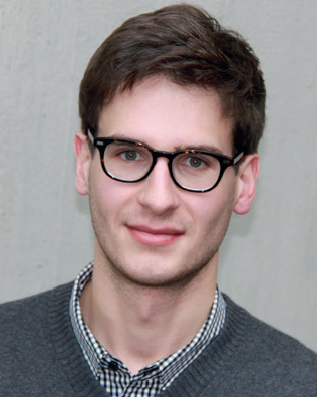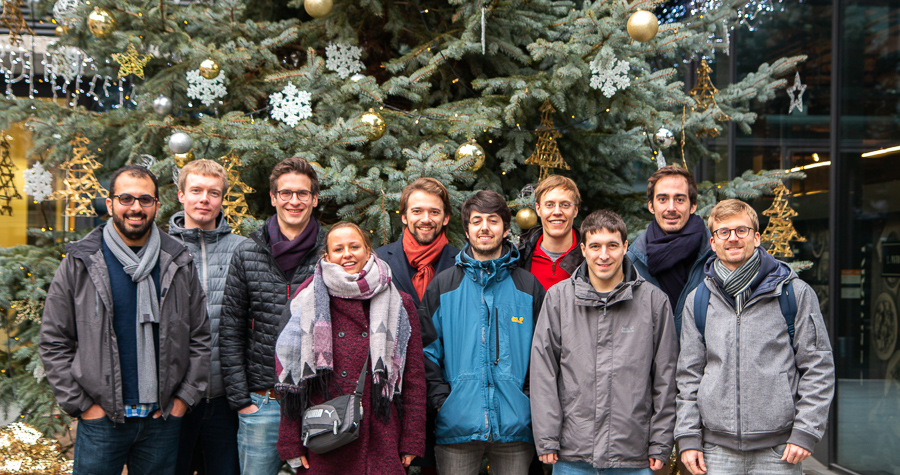"We want to take the Internet 'to the next level'"
Professor Laurent Vanbever is head of the Networked Systems Group (NSG), and two-time winner of the students’ award "Golden Owl". In our interview he explains how he gazed in awe at the large computer infrastructures in his father’s office as a child, and how he, nowadays, makes students realize that it takes a truly collective effort to make the Internet work.
Prof. Vanbever, what is your main area of research?

My main research area is in the area of computer networks, with a focus on Internet infrastructures. In a nutshell, our goal is to make the large networks that compose the Internet more reliable, more performant, and more secure. As a global communication infrastructure, the Internet is one of the most influential inventions of our time, one that has enabled and continues to enable countless innovations. Figuring out how to take the Internet "to the next level" is therefore a key challenge of our modern society.
“I am looking forward to start collaborating with hardware people here at D-ITET, including Luca Benini from the Integrated Systems Laboratory. ”Prof. Laurent Vanbever
What brought you to this field? Why does it fascinate you?
Since I was a kid, I have always been fascinated by large computer infrastructures and what makes them "tick". I probably fell into it the first time my father, a computer engineer himself, took me with him as he needed to upgrade his company's mainframe during a weekend. I vividly remember the "awe factor" as I entered the room and started to roam around the racks filled with (now highly vintage) equipment. As I grew older, I used a lot of my pocket money to buy (second-hand) networking equipment and built my first "network" in our cellar. As the Internet started to boom in the 90s, my 56k modem started to monopolize my parent's landline, to their greatest despair. I was hooked.
What is the impact of your research on society?
I will be humble! (laughs) The impact of communication networks is gigantic: A lot of the key technologies we use every day without thinking stem from the computer network community. Examples include the Web, E-mails, video streaming, voice-over-IP, and many others.
Our research on reliable and secure network operations aims at ensuring that our society stays connected. Nowadays, a lot of people consider always-on connectivity as "granted". Unfortunately though, this is far from being true. Simply consider the outage that recently affected Swisscom. Besides hundreds of thousands of Swisscom customers who couldn't access the Internet for hours, the outage affected emergency numbers which were not reachable in multiple cantons. It is in moments like these that one truly realizes the critical importance that Internet connectivity plays in our daily lives.
You are doing research on blockchain technology. What is your group doing in this area?
Blockchain is an important technology which enables us to build a large-scale distributed database. In the case of Bitcoin, this distributed database spans across the Internet and records the movements between different accounts. In our research we are interested in studying blockchain technologies from a networking point of view. Among others, one question we looked at recently is: Where are the Bitcoin nodes located in the Internet topology and how are they spread? To our surprise, it turned out that a lot of them are located in few places in the Internet topology. From a pure networking point of view, the cryptocurrency is not that decentralized. This is a security risk because it enables so-called "Man-in-the-Middle" attacks in which malicious networks can gain access to a large important part of Bitcoin traffic and manipulate it. We showed that these attacks are practical and can lead to important money losses. In our follow-up research, we are now looking at how we can prevent these attacks, e.g. by building secure overlay networks.
Which courses are you teaching this semester and what will you teach next semester?
This semester (Spring 2020) I am teaching "Communication Networks", our flagship lecture for Bachelor’s and Master’s students in which we teach students "how the Internet works and why". One of our projects in this course involves having the entire classroom (150+ students this year) build, maintain, and operate their very own mini-Internet. Doing so, students realize that it takes a truly collective effort to make the Internet work. The fact that all students need to work together for their Internet to work really helps to bring together the entire classroom.
Next semester I will be teaching our advanced lecture on communication networks (Advanced Topics in Communication Networks). In addition, I will also be teaching "Discrete Event Systems" together with Prof. Roger Wattenhofer and Prof. Lothar Thiele for Bachelor’s and Master’s students.

Are you collaborating with other people at D-ITET or other departments at ETH Zurich?
Definitely! Computer networks is an inherently interdisciplinary area, filled with practical problems for many disciplines. Our focus on reliable and correct network operations naturally led us to collaborate with research groups active in more theoretical disciplines, like the one from Martin Vechev (Secure, Reliable, and Intelligent Systems Lab, D-INFK). I also have joint projects with Ankit Singla (Network Design & Architecture Lab, D-INFK).
Besides reliable network operations, our research interests have been recently moving towards programmable network hardware, i.e. network devices equipped with reprogrammable ASICs. As such, I am looking forward to start collaborating with hardware people here at D-ITET, including Luca Benini from the Integrated Systems Laboratory (IIS).
How do you like ETH as a research institution?
It would be hard not to like it. The research environment is top-notch. We have great students, many of whom are interested in doing research. We have world-class colleagues in all scientific disciplines. We also have a great eco-system of companies, many of which are interested in collaborating on solving practically relevant problems. Last, but definitely not least, we have great support from the university itself. In Europe, I don't really see another place that could rival.
How international is your group? Are you currently looking for doctoral students?
My group is quite international. Out of nine doctoral students, there are four Swiss, two Spanish, one German, one Greek, and one French. Furthermore, our first doctoral graduate, who graduated last year, is from Gaza (Palestine). And, yes, I am looking for new doctoral students. If people reading this are interested, they should definitely feel free to contact me. The best way to reach me is by E-mail.
What are currently the biggest challenges in your field of research?
There is no shortage of challenges in computer networks. A few that come to mind include: bringing Internet connectivity to remote areas, especially in developing countries; drastically reducing the energy consumption of our computing and networking infrastructure; and scaling the Internet infrastructure to cope with the explosion of video traffic (which accounts for more than 75% of the Internet traffic already), and the increasing numbers of hosts due to the Internet of Things (IoT). Another challenge includes improving the reliability of the Internet infrastructure, from attackers, but also from “honest” mistakes.
I am optimistic: I believe we will find ways to handle these challenges. We have come very far already and, clearly, the Internet is not going to disappear in the future.
Professors at D-ITET
In our interview series, professors at D-ITET give an insight into their research and personal motivation to go into academia.
